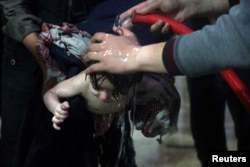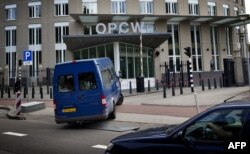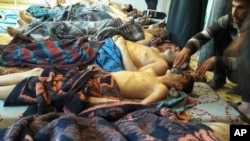International chemical weapons inspectors face a dilemma.
They’ve been supplied by rebels with the coordinates of the burial site of dozens of victims of the alleged deadly gas attack that prompted earlier this month retaliatory U.S.-led airstrikes on Syria.
But to gain access to take samples from corpses, they’ll need permission from Syrian and Russian officials, who they fear will obstruct them.
More than 40 victims of the suspected chemical attack on the Syrian town of of Douma on the outskirts of the capital of Damascus were buried in unmarked graves by insurgents, political activist Zaher ak-Sakat, a rebel commander and former Syrian general, told Britain’s Sunday Telegraph.
They hoped international inspectors would be able to access the site to collect samples from the hair, skin and clothing of the dead, possible crucial evidence to support claims the Syrian government mounted a gas attack.
“They were buried just as they were found. It will be easy to get samples from the hair and clothes and eventually prove what was used,” he said.
The United States, France and Britain remain convinced Douma was the subject of a chemical attack on April 7, basing their claims on open-source information and their own intelligence, which they said suggests chlorine and possibly a nerve agent, maybe sarin, were used.
The Syrian government and Russia deny any chemical attack took place, saying it was fabricated or staged by the rebels and the White Helmets, volunteer first responders who work in insurgent-held territory.
Samples being collected
On Saturday, a team of inspectors from the Organization for the Prohibition of Chemical Weapons entered Douma after being forced to wait for almost a week in the Syrian capital either for permission to start their work that will include sample collection, taking survivor statements and gathering video documentary evidence, or to gain clearance from U.N. security officials.
France’s foreign minister, Jean-Yves Le Drian, said the delay amounted to “obstructionism” by the Syrian government of President Bashar al-Assad aimed at undermining the caliber of the probe.
The OPCW said its team visited one of the two sites reportedly bombed. Collected samples are to be sent initially to a laboratory at The Hague, and then analyzed by other labs, the agency said. Other information and “materials” have also been collected by the inspectors, it said.
“The OPCW will evaluate the situation and consider future steps, including another possible visit to Douma,” the watchdog agency said.
Important traces of toxic chemicals would likely still be present in the environment and from victims' remains, said Alastair Hay, an environmental toxicologist at Britain’s University of Leeds.
“Nerve agents like sarin can be present in the environment for many weeks after use, and particularly if you look near the site where a weapon has exploded,” he said. “Autopsy samples, if available, will provide invaluable evidence, and nerve agents can be found in many organs,” Hay told the AFP news agency.
But evidence of chlorine gas fades fast, toxicologists say.
Claims, counter claims
Rebels and activists accuse the Syrian government and Russians, who sent military police to Douma after the rebels agreed to withdraw after April 7, of removing forensic evidence of chemical weapons. The Douma attack has been the subject of a swirl of conflicting claims and counterclaims and rival theories, mostly fought out on the internet. The Kremlin has accused Britain of ordering rebels to stage an attack.
“With any war crime in Syria receiving significant media coverage, there has been a concerted effort by pro-Kremlin and pro-Assad individuals and media outlets to spread claims attacking the Syrian Civil Defense (White Helmets), a major source of information and footage on war crimes in the conflict. These attacks generally fall into two categories: claiming that the White Helmets are al-Qaida or ISIS (or even sometimes both), and claiming that the White Helmets fake images of war crimes for gullible Western audiences and media outlets,” said Elliot Higgins, a freelance investigative journalist.
Higgins’ geo-tagging tracking of the trajectory of missiles fired in a 2013 chemical attack was seen widely as important open-source evidence undermining Syrian government denials.
The Syrian government denies having ever used chemical weapons during the seven-year-long conflict. But U.N. and OPCW experts have blamed the government for four deadly gas attacks, including one on the rebel-held town of Khan Sheikhoun a year ago, involving the sarin nerve agent that left more than 80 people dead.
Since April 7, Russian and Syrian state-run television outlets have broadcast reports casting doubt on the Douma attack. Their reports have included testimony from local doctors and residents, and in one case a child, who said the whole incident was staged. But Douma residents have told Western reporters that testimonies were coerced.








